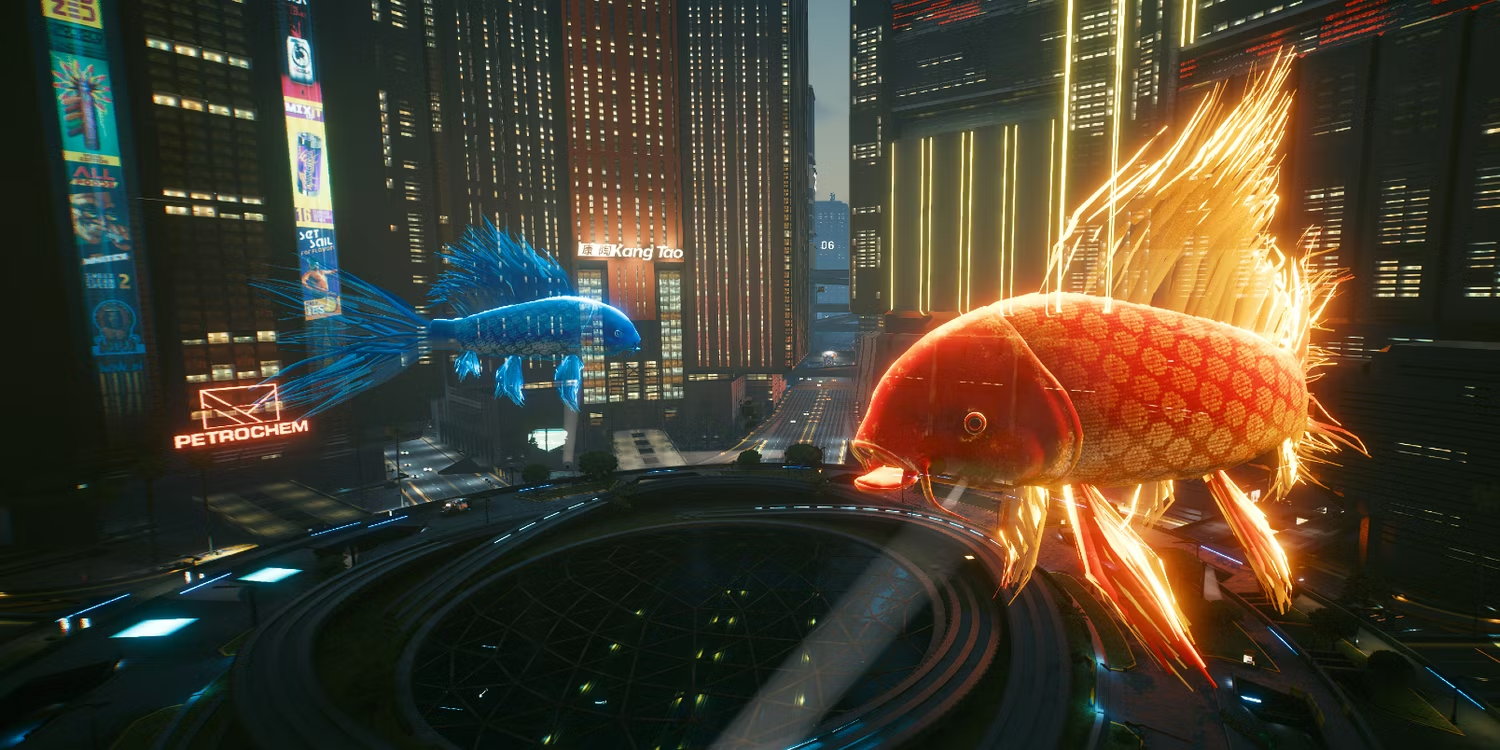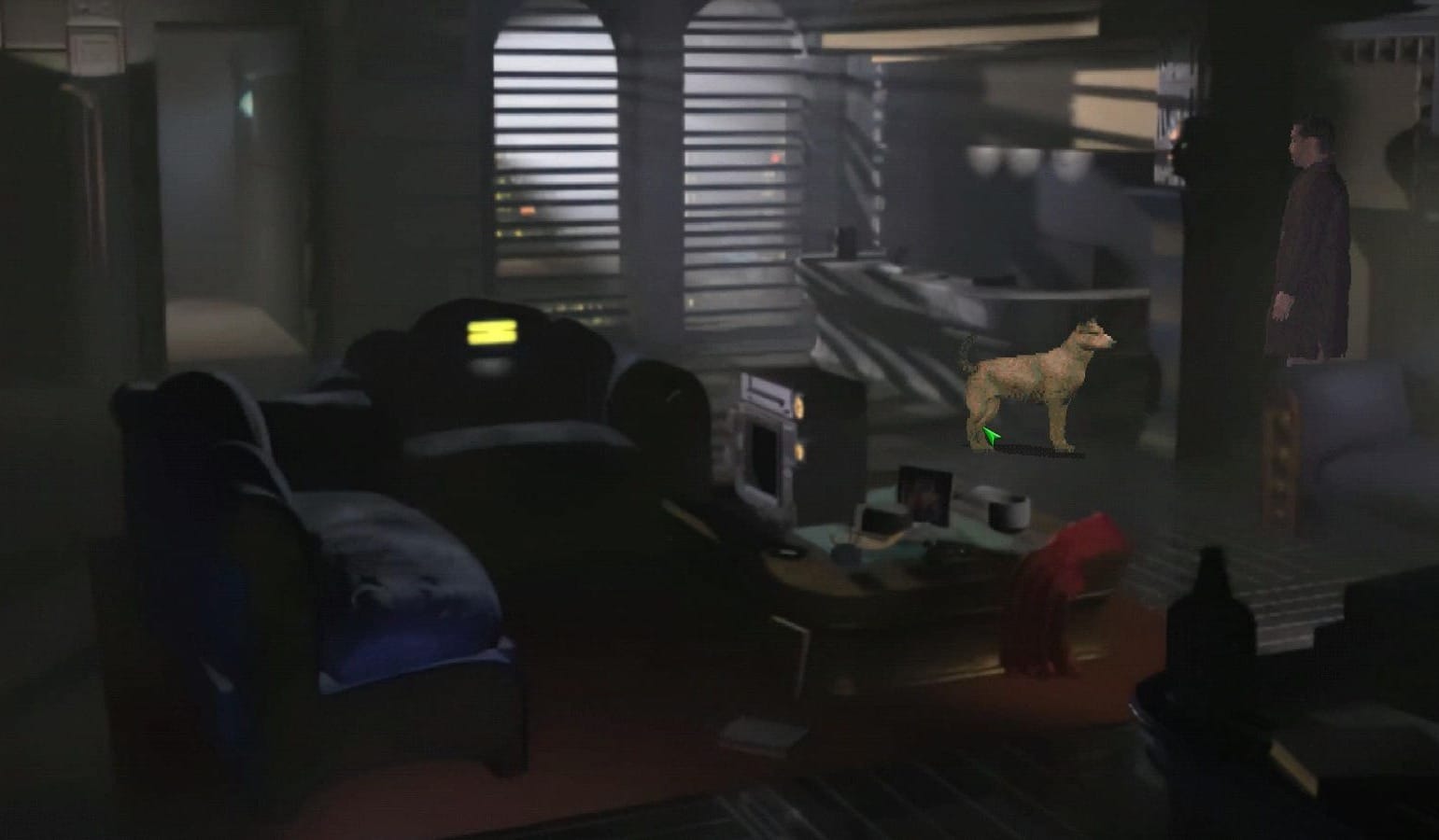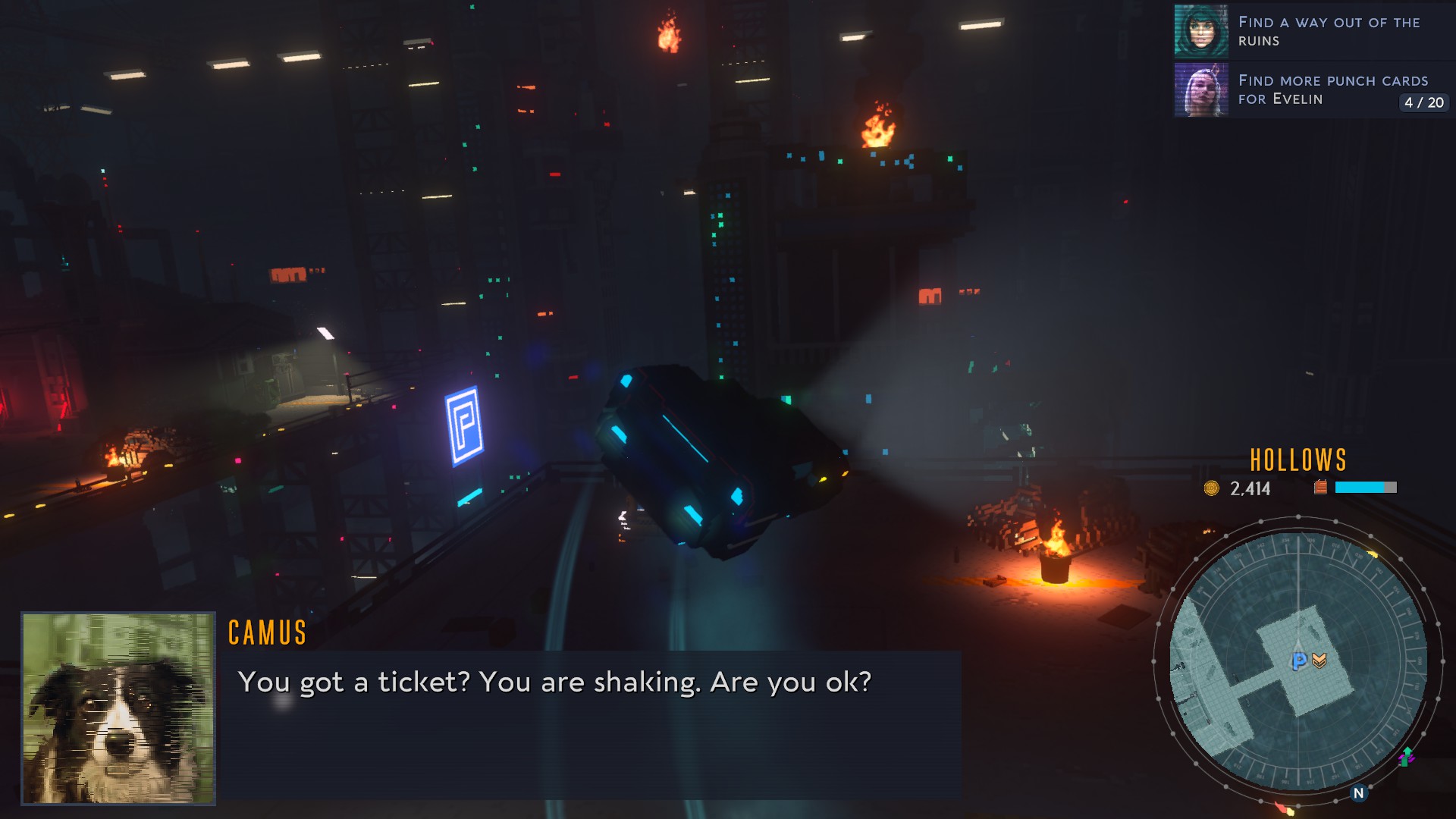Which cyberpunk video games will let me own a dog?
Can you punk the dog?

Cyberpunk is a subgenre of science-fiction focused on dystopian future worlds where technological innovation is inversely proportional to societal progress. Everyone gets computers in their eyeballs, but billions suffer due to wars, poverty and environmental collapse. It's like 2024, if holograms were cheaper.
Video games love the cyberpunk genre; the potential for extremely cool things to happen right next to desperately awful events is fertile ground for an adventure. What if you were friends with Keanu Reeves, and he had a robot arm, and you were sad. What if you had to survive as an outcast on a space station, and you were sad. What if you worked in a cyber-bar serving sad people, and you were also kind of sad.
You know what video games also love? Dogs. If you can see a dog, or talk to a dog, or maybe even pet the dog, then your game, at the very least, contains a dog.
"Nobody can deny that this game has a dog in it." - 9/10, GameSquirt
Dogs have been part of human societies for more than 30,000 years—10,000 years before the domestication of horses—and, as such, occupy an important place in our culture and identity. The image of a dog alongside their human companion appears over and over in all kinds of art and media. Cyberpunk stories, however, are about societies gone rotten.

In Cyberpunk 2077, by CDProject RED, animals are mostly just... gone. Wildlife like birds and rats are long extinct due to disease and human intervention; many plants have gone extinct as well, which doesn't leave a lot behind for remaining animal populations. The streets of Night City are teeming with gangs, cops and glitch-prone cyber-sedans, but creatures are nowhere to be found. Cats are around, however, and one cat, called Nibbles, can even become your pet during the game. There are compelling arguments hypothesising this cat has origins that are more mystical than biological. Despite their imminent extinction, you can also find and hatch an iguana egg.
We are told that dogs exist. You will never see a dog. Obviously, this means you also can't own a dog. While there are said to be dogs in Night City, there is also evidence that owning one is very expensive, and getting caught with an unauthorised pet carries an intense fine. Cyberpunk 2077 is a game all about following the rules, after all.
Why no dogs? The intentional choice to include cats and not dogs doesn't have immediately apparent reasoning, but it could be an emotional decision. Cats are often characterised as wanderers, aloof ne'er-do-wells sleeping in trash and displaying rugged individualism. If the world ended, cats would simply shrug; at least in their popular imaginings. Dogs are loyal companions, faithfully supporting their human masters in whatever ways they can, gleefully bounding through the world and doing their best to do their best. Perhaps dogs are simply too happy for the world of Cyberpunk 2077, and maybe it would be too much for the audience to see them sad.

Blade Runner's Ray McCoy owns a dog. I mean, he probably owns a dog. Temporarily.
Maggie, the aforementioned dog, lives in McCoy's apartment at the start of the game, and you can feed her treats. McCoy is a big fan of the animal, sounding genuinely happy whenever you interact with her, or when she comes up in conversation. At the local market, he can buy a necklace with 'Maggie' on it from a jeweller.
Partway through the game, McCoy is accused of being a replicant—a synthetic humanoid lifeform, built to work for real humans, and outlawed on Earth—which makes him a fugitive. When he finds his way back to his apartment, a stranger is living there, claiming to always have lived there and having no knowledge of any dog. Once McCoy's name is cleared, you can return home again, and the timeline splits. In some playthroughs, McCoy's dog has been killed by another Blade Runner named Crystal Steele, the corpse left as a sick message on his living room floor. In other versions of the story, the dog is used as bait in a later scene, killed by a bomb strapped to her by one of the replicants.
Either way, your dog is dead before the game is over.
In the first timeline, McCoy is told the dog wasn't even real. Despite his assertions that it was a genuine animal, other characters tell him it was an animoid, a simplified clone of a real dog that ran on rechargeable batteries. Animals are all but extinct in Blade Runner's universe as well, and it's framed as ridiculous to think McCoy could afford one.
Maggie is also presented as another argument for McCoy being a replicant himself, implanted with fake memories of a loving pet to sit parallel to his fake memories of being a Blade Runner. Only a replicant could believe the dog was real, after all.
Owning a dog is implicitly a very human behaviour, but the implication that Maggie isn't real means McCoy's humanity is also a lie. Our relationships to animals—particularly domestic animals—define our identities and our personhood, in real or fictional worlds. On the other hand, Ray McCoy, replicant or human, felt true affinity for Maggie. Doesn't the existence of those emotions make McCoy human, even if he's also a replicant?

Cloudpunk's Camus is (ostensibly) a dog and is owned by the game's main character (more literally than most dogs). Rania was forced to sell the body of her robotic canine to pay her debts, retaining the AI brain of Camus and temporarily uploading it to her cyber-taxi's onboard computer.
They turned your dog into a car.
Cloudpunk is a cyberpunk story a little truer to the definition than the other games mentioned, a dystopian tale of corporate greed that focuses less on explosions and more on the mundane horrors of living under the thumb of society. Rania isn't on a mission to kill the president of Evil Corp or save the day. The enemy is debt, and the villain is a world that allows for such debts. The dog is a victim in this case, innocent and ignorant of the difficulties Rania experiences.
Camus speaks to Rania throughout the game, in English, but with the intelligence, understanding and elocutive zeal of a dog. It's intentional comedy; it's also used not only to explain the world to the player, but to highlight the inequalities of the world. The suffering. Rania suffers quietly in a system that feeds on her struggles, unable to rage against it for fear of losing the chance to help Camus. Camus suffers without the context to recognise the pain.
The story of Camus and Cloudpunk isn't ever happy, even when it has a happy ending. You can get your dog's body back, complete with the ever-present Damocles Sword; Camus is still a product, no matter how much Rania loves him. Capitalism decides whether Rania is allowed to keep her pet, and bases that decision on mathematical levers well out of her control. Society kindly grants people the temporary luxury of living a full life, family included. The corporations own Camus, and Rania, and everything else.

At the heart of these stories is a world that wants to strip away the things that make us real, make us human. Or dog. Cyberpunk is as much about the forces and masters of technology erasing us entirely as it is about literal poverty and greed. When those in power seek only more power, they lose their humanity, and see no reason to tolerate humanity in those below.
What counts for a dog in Citizen Sleeper scares the soul from my body. Hunters are digital entities with dog-shaped bodies and floating orbs where the head might be anticipated. White tendrils pour from a hole in the neck and swirl around the orb, providing a way for the creature to sense activity. If your Sleeper—a synthetic body with a digitised human consciousness inside—accesses the data cloud on Erlin's Eye, eventually they will attract the Hunter's attention. Its programmatic mission is to track unlawful sentient creatures in the cloud, and send an assassin program to eliminate them. That's you, the player.
Interactions with the Hunter are unimaginably tense and deeply unsettling. It stalks around your form and attempts to probe for more information, the descriptions of its movements decidedly animalistic. The Hunter is just familiar enough to make its otherness significantly worse. These moments really do feel like you're being hunted, but by something that runs on instinct rather than code.
The Hunter as a dog-like creature in form and behaviour is an intentional nod to the origin of the Hunter itself. It was created by a corporation, Solheim, which collapsed after once owning most of the system. Absent any true masters, the Hunter simply continued carrying out its role, becoming more warped and feral over time. A dog once owned, now abandoned and causing pain and suffering in the wake of a dead owner. Dogs are our friendly, loyal, reliable companions in the present day, and it's troubling—but plausible—to imagine them turning after society crumbles. Dogs represent hope, and creatures like the Hunter represent the hopeless conclusion of a society that forgets its humanity.

Can you own a dog in a cyberpunk game, then? Both the idea of having an unconditionally supportive companion and the reality of owning a pet in these dystopias runs counter to the ways these fictional societies work. If you want a dog, you'll need to be rich, or compromise your entire way of living to make it work. If you already have a dog, it will be used as a status symbol and marker of your personal humanity whether you consent to that or not.
Even if you navigate the personal hurdles required to own a dog, and capitalism doesn't manage to forcibly pry the beast from your desperate fingers, their mere extant possibility is an open question. The world may simply be too awful, too dead, too far gone to allow the existence of dogs.
All of these societies consider the subject, however. The vital role of pets and companions is given weight, even in worlds that tried to kill them off. That's the true, feral, Rage Against the Machine thesis of a good cyberpunk narrative: the world sucks, so we fight harder. Cyberpunk is about the reaction to dystopia as much as the dystopian society itself; it's a messy, neon-soaked call to action.
Destroy power. Embrace the flaws in humanity to be more human. Fight for your chosen identity. Get a dog.
